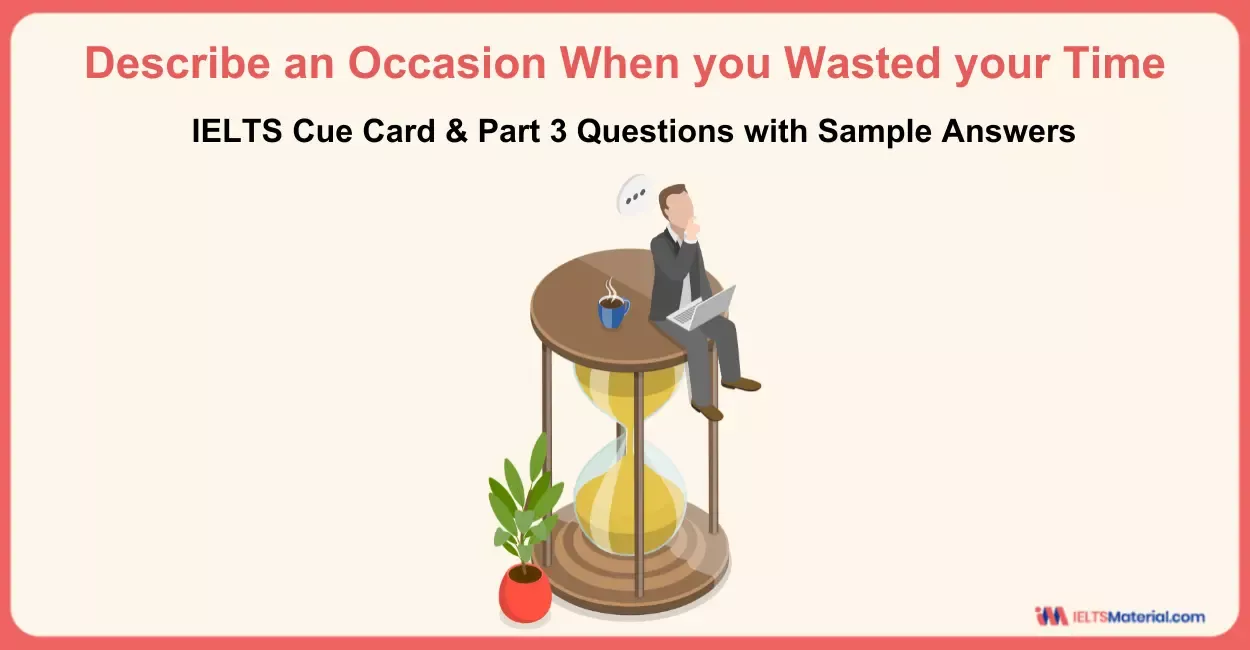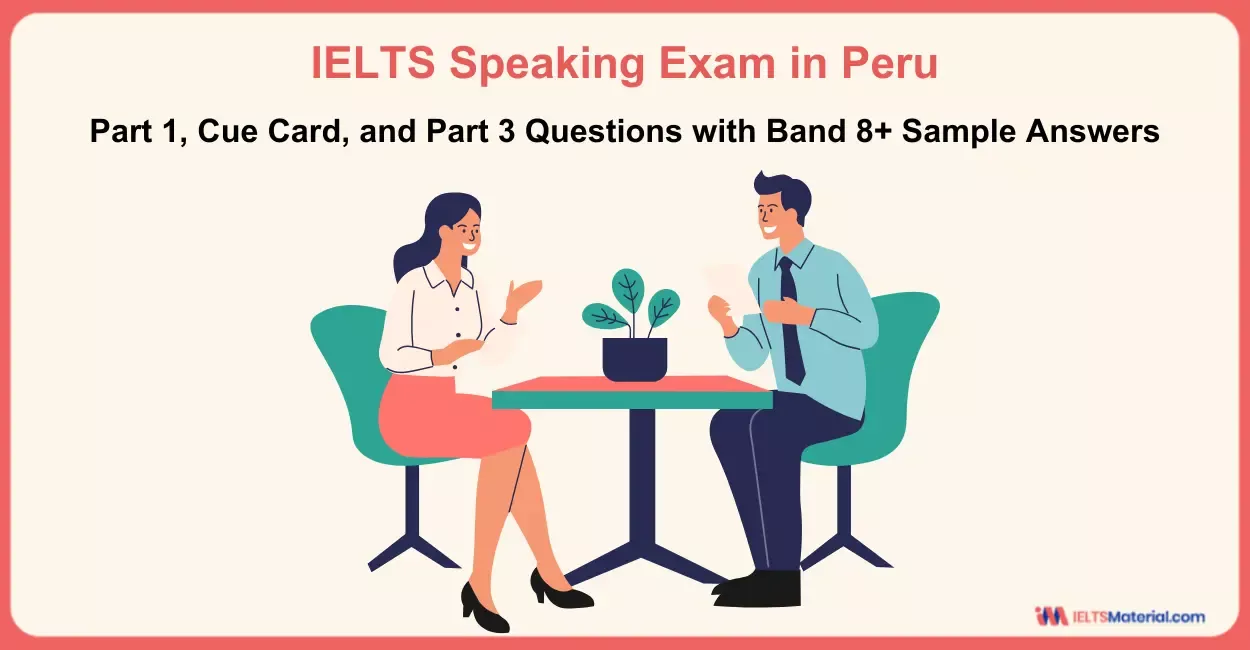Describe a Person Who Encouraged You to Achieve a Goal – IELTS Speaking Cue Card & Part 3 Questions with Sample Answers
9 min read
Updated On
-
Copy link
Express your ideas coherently by practising with the IELTS Speaking Cue Card, 'Describe a Person Who Encouraged You to Achieve a Goal'. Learn how to analyze the sample answers for Part 2 & 3 and check out the vocabulary words to boost your band scores.
Table of Contents
- How to Analyze Sample Answers for the Topic ‘Describe a Person Who Encouraged You to Achieve a Goal’?
- Sample Answer 1 for IELTS Speaking Cue Card on ‘Describe a Person Who Encouraged You to Achieve a Goal’
- Sample Answer 2 for IELTS Speaking Cue Card on ‘Describe a Person Who Encouraged You to Achieve a Goal’
- IELTS Speaking Part 3 Questions on ‘Describe a Person Who Encouraged You to Achieve a Goal’

Limited-Time Offer : Access a FREE 10-Day IELTS Study Plan!
Setting goals plays an important part in life which is a frequently discussed topic in the IELTS Speaking test. This topic, ‘Describe a Person Who Encouraged You to Achieve a Goal’, gives you an opportunity to clearly and confidently express your ideas. Whether you are asked to describe a goal that you have achieved, the one that you are working towards, or just your general thoughts on why goals matter, you can brainstorm ideas effectively.
Such cue card topics in the IELTS Speaking section along with Part 3 questions allows you to express ideas, thoughts, and experiences in an organized manner. By practising with this topic, you will be trained to respond to an individual question, such as an experience of a special meal, with good fluency, coherence, and range.
Connect with our IELTS Experts to crack your IELTS Speaking and ace the exam with a band 8+! Book a Free Demo.
How to Analyze Sample Answers for the Topic ‘Describe a Person Who Encouraged You to Achieve a Goal’?
By carefully analyzing any sample answers, you will be able to justify why a particular answer is effective in vocabulary use, fluency, coherence, and grammar. For the cue card topic, "Describe a Person Who Encouraged You to Achieve a Goal," you can identify useful expressions, organize ideas well, and apply those techniques to your own speaking practice. With this technique, you will be able to level up your preparation and get a higher IELTS Band Score. Below is the table which would guide you through the tricks to analyze the sample answers.
|
Topic |
Strategies |
Example |
|
Content & Relevance |
Check answers to see if the cue card prompts are directly addressed |
My high school teacher encouraged me to participate in a science competition. |
|
Vocabulary Use |
Identifying topic-related words, idioms, and exact expressions. |
Use topic specific vocabulary words such as encouraged, motivated, inspired |
|
Grammar & Accuracy |
Practice using tense, connectors, and sentence structures. |
She had always believed in my abilities, so I decided to work harder to prove myself. |
|
Fluency & Coherence |
Identify smooth flow, linking ideas, and logical order of ideas. |
Firstly, I will talk about who the person is, then how they motivated me, and finally, the impact it had on me. |
Want to learn how to score a band 9 in the IELTS Speaking Section? Check out the video below!
IELTS Speaking Cue Card Question on ‘Describe a Person Who Encouraged You to Achieve a Goal’
Describe a person who encouraged you to achieve a goal.
You should say :
- Who this person is
- How this person encouraged you to do
- How this person helped
- And explain why this encouragement help you to achieve the goal
Sample Answer 1 for IELTS Speaking Cue Card on ‘Describe a Person Who Encouraged You to Achieve a Goal’
Without a doubt, good friends are especially important during times of crisis and turbulence.
Today, I’m going to describe a lovely friend, Phuong Chau, who encouraged me to overcome difficulties and helped me to achieve my long-held goal. We have known each other since high school and maintain a special bond until now. Chau is an energetic, carefree, humble girl, whose most special traits are cheerful disposition and steadfast resilience.
Ever since high school, I have always dreamt of winning a prize in the National Contest for gifted students, yet that was by no means an easy task. Falling short of my expectation to join the National Contest school team, I was eliminated in the last round and had to wait for the next year. At that time, Chau was always beside me. She told me that things would become brighter, and I grew strong enough to confront such a challenge. Therefore, instead of being disappointed and demotivated, I displayed a firm commitment to change and try harder. I followed Chau’s advice, seeking assistance for my essays and language skills. As a result, in grade 12, I improved vastly and won a place in the National Contest school team.
I felt indebted to her because when I found myself going through a hard time, my closest friend never failed to cheer me on and sailed through both emotional and academic setbacks. Her sustained belief in my inner strength helped me overcome obstacles, make progress, and seek opportunities to succeed. Thus, achieving that honorable prize was all the more rewarding and meaningful to me, because I could share it with my beloved friend.
Grab the Comprehensive IELTS Speaking Band 8 Preparation Course to access the sample band 9 answer scripts and band 9 vocabulary related to specific topics!
Sample Answer 2 for IELTS Speaking Cue Card on ‘Describe a Person Who Encouraged You to Achieve a Goal’
My high school English teacher, Mrs. Sharma, was one source of inspiration for me in achieving a goal. She truly did encourage me to apply myself to communication skills, which were so instrumental in my IELTS preparation. She mostly encouraged me by constantly reminding me of my potential. Sometimes when I was nervous about speaking before the class, she would commend me for even trying and say that it was fine to make mistakes because that was how we learnt. All that actually enhanced my confidence.
Besides moral encouragement, she had practical ways of encouraging me. She told me to read English novels, watch news channels, and participate in debates in school. I was reluctant at first, but she kept pushing me on gently, and eventually I began to enjoy these activities.
This support of hers was binding on me in that all of her encouragement changed my attitude. I went from fearing English to seeing it as a challenge I could overcome. With her support, I got the courage to practice in a big way and also scored quite high in the exams. Honestly, without her guidance, it was something I wouldn't have made much effort or confidence in achieving.
Vocabulary for IELTS Speaking Cue Card on ‘Describe a Person Who Encouraged You to Achieve a Goal’
-
turbulence : a state of confusion without any order.
Eg: The era was characterized by political and cultural turbulence.
-
disposition : the particular type of character that a person naturally has.
Eg: She is of a nervous/cheerful/sunny disposition.
-
unflinching : not frightened of or not trying to avoid something dangerous or unpleasant.
Eg: It is a brave and unflinching account of prison life.
-
indebted to : grateful because of help given.
Eg: We’re deeply indebted to you for your help.
-
setback : something that happens that delays or prevents a process from developing.
Eg: There has been a slight/temporary setback in our plans.
-
instrumental : great assistance in making anything happen or in bringing about success.
Eg: Good time management was instrumental in his success in the exam.
-
commend : To praise formally or sincerely, repeat with an award.
Eg: The teacher commended her students for their creativity in the project.
-
reluctant : Unwilling and hesitant to do something.
Eg: She was reluctant to speak in public because she lacked confidence.
-
binding : Influential and compelling to an extent that one cannot ignore it.
Eg: Her advice was binding on me because I respected her experience.
Explore the IELTS Speaking Tips and Hints to Get A Band Score 8+ to level up your speaking preparation.
IELTS Speaking Part 3 Questions on ‘Describe a Person Who Encouraged You to Achieve a Goal’
The IELTS Speaking Part 3 will present you with questions that are more abstract and ask you to express opinions. It is crucial for you to express your point of view clearly, with relevant reasons and explanations based upon logic. There will not be any preparation time, unlike the Part 2, for which you will have to answer on the spot. Let’s check out the questions for Part 3 on the topic, ‘Describe a Person Who Encouraged You to Achieve a Goal’.
-
Is it important for teenagers to have goals?
Teenagers need to have goals. Aimless life is a miserable life. Being aimless makes you wander unnecessarily. Goals give meaning to life. They also serve as a motivation factor. For example, a student in twelfth grade should have a goal to get into a good university with a scholarship. This will act as a driving force for him/her to study well and score good marks.
-
What do you think would encourage young children to learn more?
The abilities of children vary from one to another. For example, a child may learn best by seeing visuals. So you need to train the child to read books with pictures. Another child may learn by listening to audios. So you need to play different rhymes and make him listen to it. Also, you have to make learning fun for them.
-
How should people encourage children?
People should inculcate a positive attitude in children in ways that they can encourage them to read books as it develops their knowledge. Also, one should encourage them to participate in sports activities which build team spirit. Individuals should concentrate only on the understanding that the child has acquired and not measure his performance. Along with that, people should also celebrate their small accomplishments.
-
How could one make children interested in things that they don’t have an interest in?
A person should make learning exciting and fun. Listen to the child, even if one disagrees with their ideas. When they find that their opinion counts, they feel more confident. For example, if there is a child who hates maths, try to avoid conventional methods of teaching and adopt newer ones like an abacus.
-
Who do you believe motivates a person more? Is it family, teachers, or friends?
I think it depends on the situation. For academic goals, teachers tend to motivate strongly, whereas family encouragement acts as a catalyst and is more important for personal goals. Friends could be the best motivators, as they share the same struggles with us either in age or stage of life. Therefore, it could have a holistic development.
-
Do you think children need more encouragement compared to adults?
Yes, I think the children require more encouragement other than that they would wander aimlessly. As they are yet to build self-confidence, they are likely to give up when faced with difficulties. Adults, on the other hand, tend to have enough life experience to be resilient in facing challenges on their own.
Vocabulary for IELTS Speaking Part 3 on ‘Describe a Person Who Encouraged You to Achieve a Goal’
-
Inculcate : To plant an idea or attitude or instill a habit in a person through repeated instruction
Eg: Teachers should inculcate good studying habits into children.
-
Accomplishment : Something successfully attained
Eg: Celebrating small accomplishments can serve to build up a child's confidence.
-
Resilient : The ability to bounce back quickly from adversities
Eg: By virtue of their experience, adults may well be resilient.
-
Wander aimlessly : To drift into spaces without an aim
Eg: Having a life purpose helps teenagers stay focused rather than wandering aimlessly.
-
Catalyst : Anything that provokes or speeds up change
Eg: A few words of praise will work as a catalyst in children's learning.
-
Holistic development : Development and growth in all aspects
Eg: Sports and academics together cater for the holistic development of a child.
Want to explore more words to achieve a band score of 8+? Get the book on Vocabulary for IELTS (Essential words for popular topics in IELTS) today!
To keep topics varied, practice your speaking and get ready to face the real IELTS Exam with an overall band score of 8+. This way of practicing your speaking will make your answers sound natural and increase the speed with which you express your opinions. Consequently, you may assess the level of your performance and take special note of areas of improvement.
Related Cue Cards:
Also Check:
Explore IELTS Speaking

Start Preparing for IELTS: Get Your 10-Day Study Plan Today!
Explore other Speaking Topics



Recent Articles
Haniya Yashfeen

Kasturika Samanta

Kasturika Samanta






Post your Comments